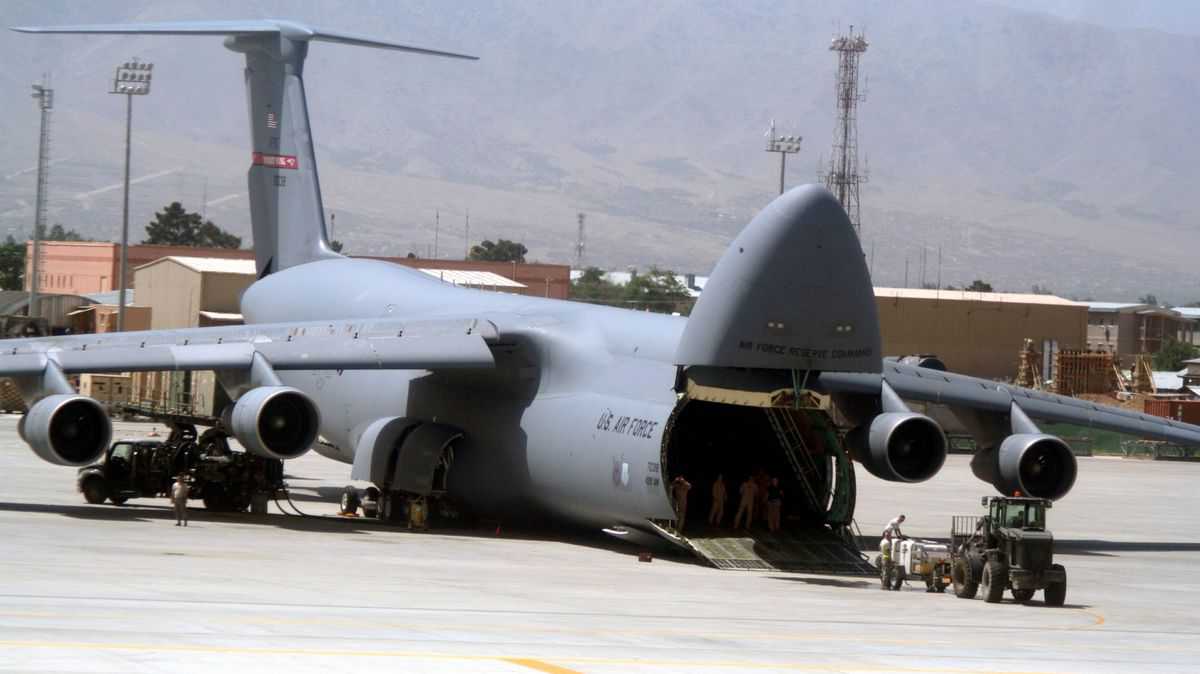The U.S. military is ready to help transport a COVID-19 vaccine around the country as soon as one is approved by regulators, President Donald Trump claimed in Tuesday night’s presidential debate. The speed at which the president wants to distribute the vaccine, and the need for ultra-cold storage, suggests Air Force cargo jets might be part of the logistics solution.
Trump contradicted estimates by Dr. Robert Redfield, the head of the Centers for Disease Control and Prevention, and Moncef Slaoui, chief adviser for the coronavirus vaccine development program Operation Warp Speed, that a vaccine, even if approved for use by the end of the year, would not be widely available until next summer.
Trump insisted drug companies could produce a vaccine much faster and that the military will help move shipments where they are needed.
“We’re going to deliver it right away. We have the military all set up. Logistically, we are all set up,” he said. “We have the military that delivers soldiers, they can do 200,000 a day. They’re going to be delivering.”
As FreightWaves/American Shipper previously reported, government officials are studying the possibility of flying giant C-5 and C-17 cargo planes loaded with refrigerated trailers that can be trucked to hospitals and other access points across the country. The military assets would supplement the commercial airlift capabilities of carriers such as FedEx (NYSE: FDX), UPS (NYSE: UPS) and Atlas Air (NASDAQ: AAWW), which could be strained trying to move millions of vaccine doses under urgent conditions.
The Department of Defense, which is helping coordinate Operation Warp Speed with the Department of Health and Human Services, insists that no significant use of military transportation is anticipated to ship vaccines.
“Our best military assessment is that there is sufficient U.S. commercial transportation capacity to fully support vaccine distribution. There should be no need for a large commitment of DOD units or personnel to support the nationwide distribution of vaccines,” spokesman Charles Pritchard said. “Any DOD-required support would be by exception. For example, military air assets may be called upon to deliver vaccines to a remote location only if no other means of transportation is feasible. However, there are no details yet on if that option will need to be used during distribution.”
Transporting the vaccine in trucks equipped with refrigerated units, rather than in individual temperature-controlled containers, would also eliminate outdoor transfers with aircraft, helping to ensure the integrity of products that must be chilled or frozen within strict temperature ranges.
Meanwhile, new information about the extreme temperature sensitivity of some vaccines in final trials bolsters the case for using military aircraft to ship refrigerated trucks with vaccines.
According to an article in The Atlantic on Monday, leading vaccine candidates from Moderna and a Pfizer-led team are so fragile they need to be frozen at temperatures up to minus 94 degrees Fahrenheit — below the capability of most freezers.
The Pfizer vaccine is nearly impossible to maintain at the required temperature during transit, so the company has developed special thermal containers that can keep vaccines frozen for up to 10 days but have limited capacity. Once opened, the containers need to be quickly refreshed with dry ice.
State health officials are worried about how to ship the vaccine to more rural areas without any temperature deviation. They say rural hospitals don’t have the required deep freezers. One way to compensate for the infrastructure challenge would be to remove some doses from a bulk allocation to an urban center, repack it in dry ice and drive it to remote clinics.
The CDC has selected McKesson Corp. as the centralized distributor of COVID-19 vaccines. The company will coordinate commercial logistics activity with other industry partners, such as FedEx Express and UPS.
Redfield asked governors on Aug. 27 to help McKesson set up vaccine distribution facilities so they are operational by Nov. 1, although he didn’t say a vaccine would be ready by then.
President Trump has been touting the possibility a vaccine may be approved before the November election, raising concerns that political pressure is being placed on the Food and Drug Administration to rush the process.
Click here for more American Shipper/FreightWaves stories by Eric Kulisch.
RELATED NEWS:
US Air Force could deploy freighters to fly truckloads of vaccine
Schiphol airport organizes cargo community to expedite COVID vaccine distribution











Jeffrey Balboni
Trump says his administration will be able to vaccinate 200,000 people a day. The US has 330,000,000 people. In the real math world 330,000,000 divided by 200,000 = 1,650 days. 1,650 days divided by 365 days a year is 4.5 years to vaccinate everyone.
Man talk about WARP SPEED!!!!!!